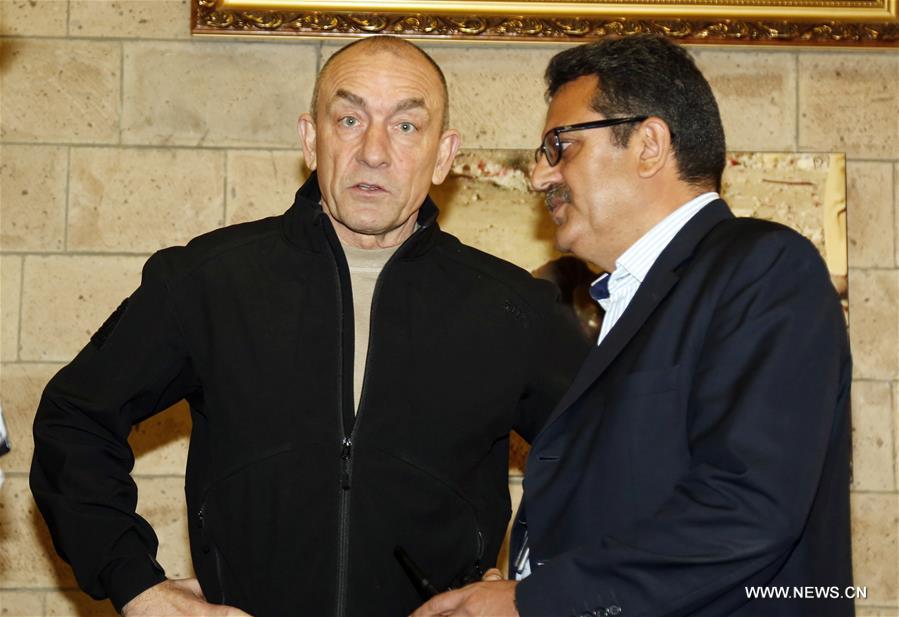
Michael Anker Lollesgaard (L) talks to a member of his team as they arrive at Sanaa International Airport, in Sanaa, Yemen, on Feb. 5, 2019. Michael Anker Lollesgaard of Denmark, the newly-appointed head of the United Nations mission to monitor a truce agreement, arrived on Tuesday in Yemen's rebel-held capital Sanaa. He was set to travel from Sanaa to the country's Red Sea port city of Hodeidah to assume his duty. (Xinhua/Mohammed Mohammed)
by Murad Abdo
ADEN, Yemen, Feb. 5 (Xinhua) -- A new team of a UN cease-fire monitoring team arrived on Tuesday in the Red Sea port city of Hodeidah for de-escalation of ground military situation between the two warring rivals.
Michael Anker Lollesgaard, leader of the UN team, arrived in Hodeidah just a few hours after a short meeting held with representatives of the Iranian-backed Houthi group in the rebel-held capital Sanaa , according to local sources.
A government official told Xinhua that the Danish general along with his new team attended a meeting between representatives from both warring sides aboard a UN-hired ship immediately upon his arrival.
The new UN observer mission will complete the task of overseeing the cease-fire and arranging troop withdrawal from Hodeidah city and three other ports.
Yemeni political observers believe the arrival of the new UN observer mission will play a significant role in boosting coordination between the Houthis and Yemen's government and work on de-escalation of the on-ground situation.
Ali Ban Hadi, a political observer based in Aden, told Xinhua that Lollesgaard will use new techniques to implement the Stockholm Agreement and avoid the mistakes made by his predecessor Patrick Cammaert in Hodeidah.
"Appointing an experienced person like Lollesgaard indicates that the UN is serious in implementing Stockholm Agreement and saving Hodeidah from further military escalation," he said.
On Monday, the UN Security Council reiterated its endorsement of the inner-Yemeni deal amid alleged violations by the country's warring parties.
The deal, reached by the government of Yemen and the Houthi rebels in December 2018, includes a cease-fire on the city and governorate of Hodeidah and the ports of Hodeidah, Salif and Ras Issa, an executive mechanism on prisoner exchange, and a statement of understanding on Taiz, a contested city.
Other Yemeni observers expected that Lollesgaard will face the same difficulties experienced by his predecessor and will not achieve advancement in implementing Stockholm's agreement about Hodeidah.
Abbas Dhalei, a political writer and commentator, said implementing the cease-fire agreement and withdrawing the Houthi rebel forces from Hodeidah do not require appointment of a new UN monitoring mission.
"Each of the warring factions continued breaching the cease-fire since its first days without paying any regard for the presence of the UN monitoring team in Hodeidah," he said.
"Exchange of random shelling between the two warring rivals will continue even more than before and Lollesgaard will probably face the same fate of Cammaert," he added.
Saleh Kaapy, an Aden-based political writer, said the United Nations intends to fracture the crisis in Yemen into smaller issues instead of providing a complete and comprehensive solution for the country's dilemma.
"The war is going on across the country but the world's attention turned into what's happening in Hodeidah only, ignoring the war taking place elsewhere in the war-torn country," Kaapy said.
In recent days, Cammaert organized two joint meetings on a UN-hired ship off Hodeidah with participation of representatives from the two-warring Yemeni rival parties to end a month-long stalemate over implementation of withdrawal from the port city.
Cammaert's convoy came under fire two weeks ago while he was shuttling between the frontlines of the rival forces in Hodeidah.
The conflict in Yemen started in 2014 when the Houthi rebels overtook Sanaa and forced the government into exile in Saudi Arabia.
The security situation was further exacerbated after the coalition launched in June 2018 an operation to retake rebel-held Hodeidah, a strategic port city that had been handling some 70 percent of Yemen's imports of food.
The fighting has spawned the world's worst humanitarian crisis and brought the poorest Arab country to the brink of famine.
Under the UN auspice, the warring parties reached a deal in Sweden in December 2018, which included a cease-fire in Hodeidah.
The cease-fire deal went into force on Dec. 18, 2018, but the withdrawal of the rival forces has yet to be fulfilled because of different interpretations of the Stockholm Agreement over who would control key points of Hodeidah during the partial cease-fire, according to the UN statements.
Saudi Arabia and the United Arab Emirates have been leading an Arab military coalition that intervened in Yemen in 2015 to support the internationally-recognized government of President Abd-Rabbu Mansour Hadi after the Houthi rebels forced him into exile and seized much of the country's north.















